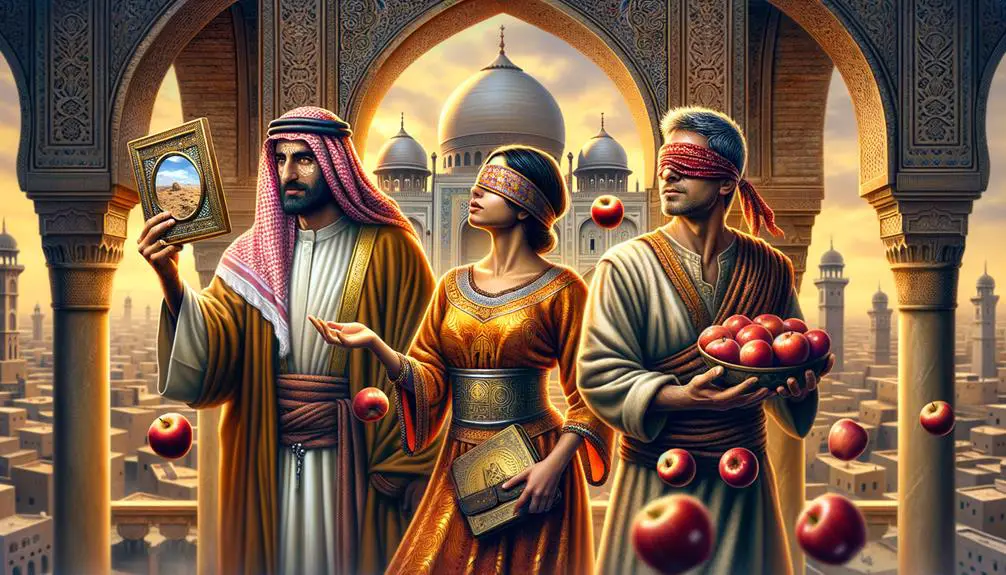Meet biblical fools who teach timeless lessons on wisdom, folly, and the consequences of ignoring life's true values.

Who Are Fools in the Bible
Like a ship navigating treacherous waters without a compass, fools in the Bible often find themselves adrift due to their own choices. You'll encounter characters like the Foolish Rich Man, whose greed blinds him to life's true riches, and Nabal, whose arrogance spells his downfall. Each tale, from the Prodigal Son's wastefulness to Pharaoh's hardened heart, offers a mirror to our own potential follies.
But what makes these figures stand out as cautionary examples? Their stories are not just ancient history; they hold keys to understanding wisdom and folly's fine line. So, let's explore what truly defines a fool in the biblical sense and why their lessons remain relevant today.
Key Takeaways
- Fools in the Bible often prioritize material wealth over spiritual depth, leading to their downfall.
- Arrogance, stubbornness, and disregard for wisdom and divine warnings characterize biblical fools.
- Impulsivity and lack of impulse control result in significant consequences for fools, emphasizing the need for deliberation.
- Fools dismiss divine messages and warnings, showcasing skepticism and indifference towards spiritual guidance.
The Foolish Rich Man

In the parable of the Foolish Rich Man, we observe a stark illustration of the perils of prioritizing material wealth over spiritual richness. This narrative, deeply embedded in biblical literature, serves as a profound caution against the seductive lure of wealth's emptiness and underscores the paramount importance of one's legacy.
Analyzing this parable, you're confronted with the folly of assuming that material abundance equates to life's ultimate fulfillment. The rich man's decision to store up treasures for himself, disregarding the welfare of others and his spiritual well-being, mirrors a common misconception that wealth can shield one from life's transient nature. His sudden death, preceding the enjoyment of his amassed wealth, starkly highlights the futility of such pursuits.
Furthermore, the parable delves into the concept of legacy's importance. The rich man, in focusing solely on his immediate gratification, neglects to consider what he leaves behind. This omission points to a profound truth: one's legacy isn't measured in material accumulations but in the impact on others and the cultivation of spiritual virtues. The narrative invites you to ponder on what truly endures beyond one's earthly existence.
In essence, this parable doesn't merely caution against wealth's potential to corrupt; it also invites a deeper reflection on the values that guide one's life. It's a poignant reminder that true richness lies not in the abundance of possessions but in a life lived with purpose, generosity, and spiritual depth.
Nabal's Arrogant Folly
You encounter Nabal's story, a narrative rich in lessons about pride and its consequences. His refusal to assist David, despite the latter's reasonable request, sets a chain of events into motion, revealing the dangers of arrogance.
This act not only angers David, prompting a vengeful response, but also necessitates Abigail's wise intervention to prevent bloodshed, underscoring the value of humility and diplomacy.
Nabal's Refusal to Help
Rejecting David's request for assistance, Nabal's arrogant folly exemplifies a profound misunderstanding of the social and divine principles governing hospitality and support in ancient Near Eastern cultures. His actions not only reveal personal hubris but also a blatant disregard for hospitality norms, cultural expectations, the protection David provided, and the potential for divine retribution.
This scenario underscores the importance of hospitality norms and cultural expectations within these societies, where mutual support and respect weren't just societal niceties but survival mechanisms. Nabal's refusal to help, despite the benefits received from David's protection, highlights a significant breach of these unwritten rules. His behavior serves as a cautionary tale about the dangers of arrogance and the necessity of adhering to established social protocols for harmony and collective well-being.
David's Angered Response
Understanding Nabal's refusal, David's response wasn't just immediate but steeped in a deep sense of betrayal and indignation, exemplifying the severe consequences of disregarding societal and divine expectations.
David, already familiar with the harshness of rejection through Saul's jealousy, found himself once again at the mercy of another's scorn. This time, however, the insult came from Nabal, a wealthy but foolish man whose arrogance mirrored Goliath's taunt, challenging David's authority and honor.
Unlike his encounter with Goliath, where David's victory was swift and divine, his reaction to Nabal's folly was driven by a deeply human anger, setting a course towards retribution.
This scenario underscores the complex interplay of personal vendettas and moral righteousness in biblical narratives, highlighting the fine line between justified indignation and the peril of unchecked wrath.
Abigail's Wise Intervention
In the wake of Nabal's arrogant folly, Abigail's astute intervention emerges as a pivotal moment of wisdom and diplomacy, averting the impending disaster wrought by her husband's insolence. This episode underscores the importance of wise diplomacy and sheds light on the complex marital dynamics of the time.
- Wise diplomacy: Abigail's quick action and thoughtful words prevent violence, showcasing her diplomatic skill.
- Marital dynamics: Her initiative contrasts sharply with Nabal's rash behavior, highlighting differing roles and expectations within the marriage.
- Prevention of disaster: Her intervention directly stops a potential massacre, demonstrating the power of wise action.
- Contrast in character: Abigail's wisdom starkly contrasts with Nabal's folly, offering a lesson in humility and foresight.
This narrative not only enriches our understanding of individual character but also offers timeless insights into human interaction and conflict resolution.
The Prodigal Son's Mistake
The Prodigal Son's mistake lay in his impulsive decision to squander his inheritance, demonstrating a profound lack of wisdom and foresight. This narrative, rich in moral and spiritual lessons, unfolds as he demands his share of his father's estate, only to exhaust it in a distant land. The inheritance squandered, he embodies the archetype of folly in Biblical literature, showcasing the consequences of reckless living and short-sighted choices.
In his journey to a distant land, his actions serve as a cautionary tale about the perils of yielding to momentary temptations without considering the long-term ramifications. His initial indulgence leads to eventual destitution, highlighting a critical lapse in judgment and self-control. The decision to leave his family and community, coupled with his extravagant lifestyle, culminates in a life stripped of dignity and resources, illustrating the steep price of foolishness.
Analyzing this narrative, it's evident that the story isn't merely about financial ruin but also about the erosion of character and values. The prodigal son's folly is multifaceted, encompassing not only his economic downfall but also his moral and spiritual degradation. His return, motivated by desperation rather than genuine repentance, initially seems to underscore his continued lack of insight. However, the father's unconditional acceptance symbolizes hope and redemption, suggesting that wisdom can emerge from folly, and restoration is possible with humility and a willingness to change.
This account serves as a potent reminder of the dangers of impulsive decisions and the value of foresight and wisdom in avoiding the path of folly.
Pharaoh's Stubbornness

Pharaoh's refusal to release the Israelites, despite numerous warnings and plagues, exemplifies a profound level of stubbornness and folly that significantly impacted Egypt's fate. This episode in the Bible underscores the dangers of a leader's failure to heed warnings and adapt to changing circumstances. Pharaoh's actions—or rather, his inactions—provide a cautionary tale about the consequences of leadership failure, especially when pride and stubbornness cloud judgment.
To understand the depth of Pharaoh's folly, consider the following aspects:
- Plague warnings: Despite repeated warnings from Moses and Aaron, Pharaoh's heart remained hardened, leading to successive, devastating plagues that wreaked havoc on Egypt.
- Social and economic impact: Each plague not only represented a divine warning but also brought about significant social and economic disruption, demonstrating the tangible consequences of ignoring wise counsel.
- Moral implications: Pharaoh's refusal to listen and relent highlights a moral failure, showcasing how arrogance can blind leaders to ethical considerations and the well-being of their people.
- Divine intervention: The narrative emphasizes that Pharaoh's stubbornness wasn't merely a personal failing but also a resistance against divine will, further illustrating the folly of opposing forces far greater than oneself.
In analyzing Pharaoh's stubbornness, it's clear that his leadership failure, particularly his disregard for plague warnings, led to unnecessary suffering for Egypt. This story serves as a stark reminder of the importance of humility, open-mindedness, and the willingness to change course in the face of clear warnings.
Samson's Blind Desire
You observe that Samson's narrative exemplifies the peril of misguided love and the dramatic consequences of acting on impulse. His story serves as a cautionary tale, highlighting how personal desires can cloud judgment and lead to one's downfall.
Through an analysis of Samson's choices, you uncover the broader theme of wisdom versus folly in human conduct.
Samson's Misguided Love
Samson's infatuation with Delilah, a figure shrouded in deceit, exemplifies the peril of allowing passion to cloud judgment. Delilah's persuasion proves lethal, exploiting Samson's blind desire to unearth the secret behind his supernatural strength. This narrative serves as a cautionary tale, highlighting the dangers of misplaced trust and the vulnerability of human folly when confronted with seductive manipulation.
Delilah's manipulation showcases the power of deceit when coupled with love.
Samson's surrender of his strength's secret marks a pivotal moment of weakness.
The tale underscores the complexities of human emotions and their potential to lead astray.
It serves as a reminder of the vulnerability inherent in unguarded affection and misplaced trust.
Consequences of Impulse
Acting on impulse, one often overlooks the far-reaching consequences of their actions, a truth vividly illustrated by the downfall of Samson due to his blind desire. His narrative exemplifies how impulsive decisions, driven by emotional reactions rather than rational thought, can lead to detrimental outcomes.
Samson's story serves as a cautionary tale, highlighting the perils of succumbing to the whims of the heart without considering the long-term implications. His inability to foresee the ramifications of his actions not only led to his personal ruin but also affected those around him.
This account underscores the importance of exercising self-control and deliberation, especially when faced with emotionally charged situations, to avert the pitfalls of impulsivity.
The Mockers of Noah

Numerous individuals in Noah's time dismissed his warnings about the impending flood, mocking his efforts to build the ark. They couldn't comprehend the possibility of a global flood, despite Noah's persistent warnings and devoted ark construction. Their skepticism and ridicule highlight a profound misunderstanding of divine warnings and the consequences of ignoring them. This scenario serves as a critical study, shedding light on human behavior and the reception of divine messages.
To understand the depth of their folly, consider the following points:
- Skepticism of the Unseen: They couldn't believe in the possibility of a flood engulfing the earth, as it was something beyond their experience.
- Mockery Over Preparation: Instead of heeding the warning, they chose to mock Noah, focusing on immediate gratification over long-term survival.
- Misinterpretation of Patience: The time taken for ark construction was seen as evidence of Noah's folly, not understanding that it was a period of grace for repentance.
- Dismissal of Divine Warnings: They failed to recognize the seriousness of Noah's prophecy, dismissing it as mere fanaticism.
This analysis reveals a pattern of behavior towards divine warnings and the peril of ignoring them. The mockers of Noah not only misunderstood the magnitude of the impending disaster but also the opportunity for salvation that was being offered. Their reaction serves as a cautionary tale about the dangers of skepticism, mockery, and indifference towards divine messages, emphasizing the importance of discernment and faith.
The Unwise Builders
In the biblical narrative, the unwise builders exemplify the folly of ignoring foundational truths, choosing instead to construct their lives on precarious grounds. This metaphorical tale isn't merely a lesson in architecture but a profound warning about the dangers of disregarding wisdom and truth in favor of convenience or haste. The foundation symbolism here is potent, inviting you to examine the underpinnings of your own beliefs and values. Are they built on solid rock or shifting sand?
The parable of the wise and foolish builders, as recounted in the Gospels, serves as a stark reminder of the consequences of our choices. Choosing to build one's life without regard to enduring principles and wisdom is akin to the foolish builder who constructs his house on sand. When the storms of life inevitably come, that house collapses, symbolizing the ruin that follows when one's life isn't anchored in truth.
Modern parallels are abundant and striking. In an era characterized by rapid change and a plethora of competing truths, the temptation to opt for what's expedient or popular over what's enduringly true is ever-present. The folly of the unwise builders warns against the superficial allure of such choices. It encourages a return to foundational principles—integrity, honesty, love, and faith—as the bedrock upon which to build lives that not only withstand the storms but also provide shelter and guidance for others.
Fools in Proverbs

Reflecting on the metaphor of the unwise builders, we now turn our attention to the wisdom literature of Proverbs, where the concept of folly is explored with profound depth and nuance. Proverbs, rich in wise sayings, offers a stark contrast between wisdom and folly, emphasizing the importance of understanding and discernment in navigating life's complexities. It's in this context that you'll discover the nuanced portrayal of fools and their foolish hearts, providing not just warnings but also guiding principles for wise living.
In Proverbs, fools aren't just individuals lacking in intelligence; rather, their folly is a matter of the heart—a refusal to heed wisdom and embrace discipline. This thematic exploration invites you to consider how foolishness is more than mere ignorance; it's a voluntary alignment against wisdom's call.
Consider the following insights from Proverbs:
- Fools despise wisdom and instruction, preferring to lean on their own understanding rather than seeking guidance.
- The mouth of a fool brings ruin near, illustrating how words can either build or destroy.
- Fools are characterized by their quick temper, contrasting with the patience and restraint wisdom promotes.
- The path of the fool is deemed perilous, a journey marked by folly's inherent dangers, emphasizing the consequences of rejecting wisdom.
These points underscore how Proverbs frames folly not just as a lack of knowledge but as a moral and spiritual failure. The wise sayings juxtaposed with foolish hearts invite a reflection on the importance of choosing wisdom's path, highlighting the intricate relationship between ethical living and true understanding.
Frequently Asked Questions
How Do Cultural Perceptions of Foolishness in Ancient Times Compare to Modern Views on Folly?
You'll find that cultural perceptions of foolishness have evolved significantly from ancient times to today. Ancient humor often revolved around physical comedy and simple misunderstandings, reflecting society's values and norms of intelligence.
In contrast, modern views on folly frequently engage with a lack of modern intelligence or awareness, highlighting more complex societal and individual flaws. This shift mirrors broader changes in societal values and the complexity of what we now consider knowledge and wisdom.
Are There Any Examples of Women in the Bible Who Are Labeled as Fools, and How Are Their Stories Interpreted?
When exploring biblical narratives, you'll find few instances where women are explicitly labeled as fools. However, the stories that do exist often intertwine foolish bravery with gender dynamics, offering a complex view of women's actions.
These tales aren't just about folly; they're about challenging societal norms and expectations. Analyzing these narratives reveals how ancient texts grapple with the concept of wisdom and foolishness, especially in the context of gender roles.
How Does the Concept of Foolishness in the Bible Relate to the Idea of Wisdom in Other Religious Texts?
In exploring wisdom's vast ocean, you'll find that the concept of foolishness in the Bible isn't an isolated island. It's intriguingly linked to the wisdom narratives across various religious texts, inviting a wisdom comparison that's as rich and diverse as the sea itself.
Religious parallels draw lines connecting dots of moral and ethical teachings, showing that wisdom and foolishness are universal themes, dissected and interpreted through different lenses, yet converging in their core messages.
In What Ways Does the New Testament Address or Reinterpret the Concept of Foolishness Found in the Old Testament?
In the New Testament, you'll find that it reinterprets Old Testament foolishness through Paul's teachings, particularly emphasizing 'Divine folly.' This concept suggests that what's considered foolish by human standards is often wise in God's eyes.
Paul argues this point to contrast worldly wisdom with spiritual understanding. You'll see this theme notably in Corinthians, where the dichotomy between divine wisdom and human foolishness is deeply explored for its theological and moral implications.
Can the Actions of Biblical Characters Labeled as Fools Be Justified or Understood in the Context of Their Historical or Cultural Background?
Diving into history's vast ocean, you'll find that actions often mirror the times. Considering moral relativism and contextual justification, you can understand that behaviors, even those deemed foolish, might've roots in societal norms or pressures.
Analyzing these actions requires a scholarly lens, recognizing the influence of cultural and historical backdrops. Essentially, what seems foolish in one era might've been rational or even commendable, given the context.
Conclusion
In wrapping up, it's clear that the Bible doesn't hold back on calling out folly, serving up a veritable smorgasbord of foolishness. From the wealth-obsessed to the arrogant, and from the stubborn to the blindly desirous, it's as if the Good Book is holding up a mirror to humanity's most laughable missteps.
By dissecting these tales with a satirical scalpel, we're reminded that perhaps the biggest fools are those who fail to see themselves in these ancient cautionary tales.



Sign up